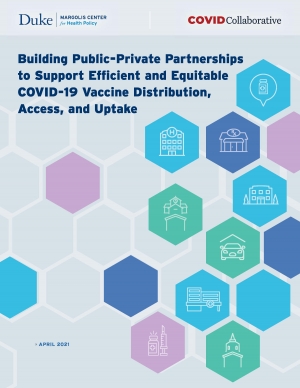
White Paper
Building Public-Private Partnerships to Support Efficient and Equitable COVID-19 Vaccine Distribution, Access, and Uptake
As vaccine supply continues to increase and becomes more readily available to the public in the coming weeks, President Biden has called for a “wartime effort” to increase the pace of vaccinations to limit the spread of COVID-19. Leveraging the full potential of the private sector and supporting improved mechanisms for public-private coordination will be essential to ensuring more efficient and equitable distribution of COVID-19 vaccines. However, additional work is needed to identify remaining gaps that private sector resources can address and determine how these resources can most effectively complement and enhance ongoing state and local efforts to distribute, provide convenient access to, and support equitable uptake of COVID-19 vaccines. This white paper highlights key opportunities and promising practices for public-private partnerships to support improved efficiency and equity in COVID-19 vaccine distribution, as well as considerations for public and private sector leaders in building multi-sector approaches to address emerging challenges.
To foster further advancement of innovative public-private partnerships for COVID-19 vaccine distribution and uptake, the Duke-Margolis Center for Health Policy and COVID Collaborative began convening vaccine experts, health systems, pharmacies, payers, employers, state leaders, and other private sector leaders for a series of virtual roundtables on opportunities for the private sector to partner with policymakers to address key challenges in vaccine distribution (see appendices for a list of roundtable participants and strategies highlighted in the white paper). The roundtables have been supplemented with more extensive follow up on examples of promising practices. Main opportunities identified in these discussions and described in this white paper include:
- Building bridges between the public and private sectors: Given the demands of the pandemic, states can expand capacity by determining how private sector expertise and resources can fill identified gaps in state and local vaccination efforts. The Washington State Department of Health's Vaccine Action Command and Coordination System (VACCS) Center provides a potential model for collaborative efforts. The VACCS Center is able to assess private sector resources and match relevant offerings with state needs. To support coordination and communication with the private sector, states can establish an identified point of contact or coordination structure to help convene public and private sector stakeholders, develop solutions, and direct resources where they can have the most impact.
- Expanding capacity for vaccinating the public: Expanding existing capacity to meet the goal of vaccinating millions in the weeks and months ahead, and to do so equitably, requires new or strengthened partnerships and collaborations. In collaboration with community-based partners, such efforts can help ensure that vaccines will be accessible in a variety of safe and convenient community-based locations, including pharmacies, community health centers, mobile clinics, mass vaccination sites, and pop-up clinics in workplaces, schools, and community organizations. In addition to expanding vaccination locations and workforce, private sector partners also may provide resources and technical expertise to address challenges in vaccine delivery, such as supply chain logistics, efficiency of mass vaccination sites, or registration and scheduling processes.
- Leveraging opportunities to support workforce vaccine access and education: Employers can be trusted sources of vaccine information for employees and can increase employees’ potential vaccine uptake through hosting on-site vaccination clinics; creating incentives to get vaccinated; addressing potential barriers to access, such as transportation or paid time off; and providing information from trusted sources, including health care providers.
- Promoting equity and engaging higher-risk populations: Private sector organizations, such as health care providers and health plans, can play unique roles in ensuring that populations at additional risk of poor outcomes from COVID-19 have access to vaccinations. As vaccine supply increases, targeted outreach efforts and community-based approaches will be critical to reach people who have not yet been vaccinated and those who may face barriers to access. Through data sharing, for example, health systems and health plans can collaborate with states to engage patients and enrollees have not yet been vaccinated in order to conduct outreach, schedule appointments, and offer transportation. Promising approaches include linking data on immunization status from immunization information systems, and using health information exchanges to share data.
Duke-Margolis Authors

Katie Huber, MPH
Policy Research Associate

Mark McClellan, MD, PhD
Director of the Duke-Margolis Institute for Health Policy
Robert J. Margolis, MD, Professor of Business, Medicine and Policy
Margolis Executive Core Faculty
